Serbophilia
Serbophilia (Serbian: Србофилија, romanized: Srbofilija, literally love for Serbia and Serbs) is the admiration, appreciation or emulation of non-Serbian person who expresses a strong interest, positive predisposition or appreciation for the Serbian people, Serbia, Republika Srpska, Serbian language, culture or history. Its opposite is Serbophobia.
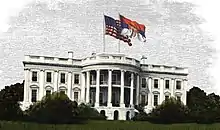
Artistic depiction of a July 1918 event in which a Serbian flag was flown over the White House alongside the U.S. one in a show of wartime solidarity; the only non-U.S. flags to have ever been flown over the White House are those of Serbia and France.
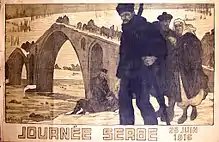
French poster from WWI
| Part of a series on |
| Serbs |
|---|
 |
History
World War I
During World War I, Serbophilia was present in western countries.[1]
Breakup of Yugoslavia
Political scientist Sabrina P. Ramet writes that Serbophilia in France during the 1990s was "traditional", partly as a response to the closeness between Germany and Croatia. Business ties continued during the war and fostered a desire for economic normalization.[2]
Serbophiles
- Jacob Grimm — German philologist, jurist and mythologist. Learnt Serbian in order to read Serbian epic poetry.[3][4]
- Archibald Reiss — German-Swiss publicist, chemist, forensic scientist, a professor at the University of Lausanne.[5]
- Victor Hugo — French poet, novelist, and dramatist of the Romantic movement. Hugo wrote the speech Pour la Serbie.
- Alphonse de Lamartine — French author, poet, and statesman.[6][7]
- Helen of Anjou — French noblewoman who became queen consort of the Serbian Kingdom.
- Mircea I and Vlad III Dracula[8]
- Several notable composers used motifs from Serbian folk music and composed works inspired by Serbian history or culture, such as:
- Johannes Brahms— German composer, pianist, and conductor of the Romantic period.[9]
- Franz Liszt — Hungarian composer, virtuoso pianist, conductor, music teacher, arranger, and organist of the Romantic era.[9]
- Arthur Rubinstein — Polish-American classical pianist.[9]
- Antonín Dvořák — Czech composer, one of the first to achieve worldwide recognition.[9]
- Pyotr Ilyich Tchaikovsky — Russian composer of the Romantic period (See Serbo-Russian March).[9]
- Nikolai Rimsky-Korsakov — Russian composer, and a member of the group of composers known as The Five (See Fantasy on Serbian Themes).[9]
- Franz Schubert — Austrian composer of the late Classical and early Romantic eras.[9]
- Hans Huber — Swiss composer. Between 1894 and 1918, he composed five operas.[9]
- Rebecca West (1892–1983) — British travel writer. Was described by American media as having a pro-Serbian stance.[10][11]
- Flora Sandes — British Irish volunteer in World War I.[11]
- Ruth Mitchell — American volunteer in the Chetniks, World War II. Sister of Billy Mitchell.[12][13][14]
- Robert De Niro— American actor[15]
- John Challis— English actor best known for portraying Terrance Aubrey "Boycie" Boyce in the BBC Television sitcom Only Fools and Horses (1981–2003) and its sequel/spin-off The Green Green Grass (2005–2009) [16]
- Peter Handke — Austrian novelist and playwright, Nobel Prize winner. Supported Serbia in the Yugoslav Wars.[17]
- Eduard Limonov — Russian writer and poet.[18][19]
- Ángel Pulido — Spanish physician, publicist and politician, who stood out as prominent philosephardite during the Restoration [20]
- Essad Pasha Toptani — Ottoman Albanian politician.[21]
- Anna Dandolo— Venetian noblewoman who became Queen of Serbia.[22]
- Józef Bartłomiej Zimorowic — Polish poet and historian of the Baroque era.[23]
- Adam Jerzy Czartoryski — Polish nobleman, statesman, diplomat and author.
- Pavel Jozef Šafárik — Slovakian philologist, poet, literary historian, historian and ethnographer in the Kingdom of Hungary. He was one of the first scientific Slavistics.
- Ján Kollár — Slovakian writer (mainly poet), archaeologist, scientist, politician, and main ideologist of Pan-Slavism.
- Ľudovít Štúr — Slovakian revolutionary politician and writer.
- Henry Bax-Ironside — British diplomat.[24]
- Eleftherios Venizelos — Greek statesman and a prominent leader of the Greek national liberation movement.
- Dimitrios Karatasos — Greek armatolos who participated in the Greek War of Independence, and several other rebellions, seeking to liberate his native Greek Macedonia.[25]
- Herbert Vivian — British journalist and author of Servia: The Poor Man's Paradise and The Servian Tragedy: With Some Impressions of Macedonia.[26]
- Alexander Kolchak — Imperial Russian admiral, military leader and polar explorer.[27]
- Yu Hua — Chinese author.[28]
- František Zach — Czech soldier and military theorist.[29]
Gallery
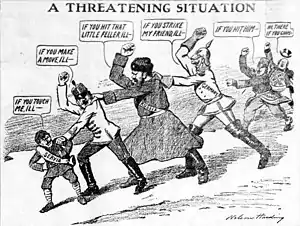 "A Threatening Situation", a comic published in the American newspaper the Brooklyn Eagle in July 1914
"A Threatening Situation", a comic published in the American newspaper the Brooklyn Eagle in July 1914 Departure for Serbia
Departure for Serbia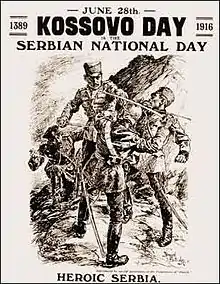 WWI poster - Kosovo Day, June 28, 1916, published in solidarity with the Serb allies
WWI poster - Kosovo Day, June 28, 1916, published in solidarity with the Serb allies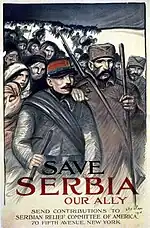 WWI poster - Save Serbia (1915)
WWI poster - Save Serbia (1915)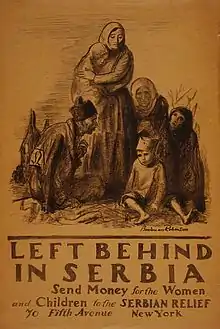 American poster of the Serbian Relief Fund, organised by Mabel Grouitch, asking for donations to help Serbia on the brink of famine.
American poster of the Serbian Relief Fund, organised by Mabel Grouitch, asking for donations to help Serbia on the brink of famine.
References
- Dobbs, Michael (11 June 2000). "Blood Bath". Washington Post.
- Ramet, Sabrina P. (2018). Balkan Babel: The Disintegration Of Yugoslavia From The Death Of Tito To The Fall Of Milosevic (Fourth ed.). Routledge. p. 356. ISBN 978-0-42997-503-5.
- Donald Haase (2008). The Greenwood Encyclopedia of Folktales and Fairy Tales: G-P. Greenwood Publishing Group. pp. 531–. ISBN 978-0-313-33443-6.
- Selvelli, Giustina. "The Cultural Collaboration between Jacob Grimm and Vuk Karadžić. A fruitful Friendship Connecting Western Europe to the Balkans".
{{cite journal}}: Cite journal requires|journal=(help) - Boskovska, Nada (2017). Yugoslavia and Macedonia Before Tito: Between Repression and Integration. Bloomsbury Publishing. p. 10. ISBN 978-1-78673-073-2.
- Mićunović, Milica (28 November 2012). "How Serbia stunned Alphonse de Lamartine". Serbia.com.
- Maric, Natasa (19 March 2021). "Pourquoi la Serbie aime tant la France et la langue française". lefigaro.fr.
- Ion Pătroiu (1987). Marele Mircea Voievod. Editura Academiei Repubvlicii Socialiste România. p. 460.
- Tomić 2019.
- Victoria Glendinning (1988). Rebecca West: A Life. Fawcett Columbine. p. 176. ISBN 978-0-449-90320-9.
- Hammond, Andrew (2010). "Memoirs of conflict: British women travellers in the Balkans". Studies in Travel Writing. 14 (1): 70. doi:10.1080/13645140903465043. S2CID 162162690.
- "War". The Atlantic. Atlantic Monthly Company. 1946. p. 184.
There are also certain American Serbophiles who will hear no evil of Mihailovich, and who repudiate as Communist-inspired any suggestion that he ever collaborated with the enemy. Ruth Mitchell, author of The Serbs Choose War, is one of them.
- Kurapovna, Marcia.Shadows on the Mountain: The Allies, the Resistance, and the Rivalries that Doomed WWII Yugoslavia. John Wiley & Sons, 2009, pp. 71–72.
- Mirkovic, Alexander. "Angels and Demons: Yugoslav Resistance in the American Press 1941–1945". World History Connected, University of Illinois website, 2012.
- "How did Robert De Niro fall in love with Serbia".
- "Boycie in Belgrade". YouTube.
- K. Stuart Parkes (January 2009). Writers and Politics in Germany, 1945–2008. Camden House. pp. 174–. ISBN 978-1-57113-401-1.
- Reljic, Dusan; Markovic, Predrag; Sebor, Janko; Mijovic, Vlastimir (16 November 1992). "Limonov & Co". scc.rutgers.edu. Vreme News Digest.
- "LIMONOV Junak našeg doba". Печат - Лист слободне Србије (in Serbian). 22 September 2011. Retrieved 8 April 2019.
- "in Serbia at Belgrade told him "I am not Spanish from there [Spain], but Spanish from the East." Andreu, Miguel Rodríguez (31 January 2017). "Serbia fuera del radar estratégico de España". esglobal. https://www.esglobal.org/serbia-del-radar-estrategico-espana Retrieved 8 June 2018.
- The Ottoman Empire and Its Successors, 1801 -1927. CUP Archive. 1966. pp. 529–. GGKEY:5L37WGKCT4N.
- Даница 2009, Вукова задужбина, О породичним приликама краља Владислава, Душан Спасић, 253–263, Београд, 2009
- Józef Bartłomiej Zimorowic (1857). "Śpiewacy" (in Polish). Kazimierz Józef Turowski, ed. Sielanki Józefa Bartłomieja i Syzmona Zimorowiczów. The Internet Archive. p.39
- Theodoulou, Christos A. (1971). Greece and the Entente, August 1, 1914-September 25, 1916. p. 151.
Sir Henry Bax - Ironside, who was considered Serbophil..
- Lambros Koutsonikas (1863). Genikē historia tēs Hellēnikēs Epanastaseōs. p. 121. OCLC 679320348.
- Bled, Jean-Paul; Terzić, Slavenko (2001). Europe and the Eastern Question (1878–1923): Political and Organizational Changes. Istorijski institut SANU. pp. 324–325. ISBN 978-86-7743-023-8.
- Acović, Dragomir (2012). Slava i čast: Odlikovanja među Srbima, Srbi među odlikovanjima. Belgrade: Službeni Glasnik. p. 632.
- Serbia, RTS, Radio televizija Srbije, Radio Television of. "Ју Хуа за РТС: Волим Србију, долазим чим прође пандемија". www.rts.rs. Retrieved 28 April 2020.
{{cite web}}: CS1 maint: multiple names: authors list (link) - Kořan, Michal (2010). Czech Foreign Policy in 2007-2009: Analysis. Ústav mezinárodních vztahů. p. 243. ISBN 978-8-08650-690-6.
Sources
- Sells, David (1997). Serb 'Demons' Strike Back (Royal Institute of International Affairs) Vol. 53, No. 2
- Tomić, Dejan (2019). Srbi i evropski kompozitori: srpska muzika i Srbi u delima evropskih kompozitora, od XIX do početka XXI veka [Serbs and European composers: Serbian music and Serbs in the works of European composers, from the 19th to the beginning of the 21st century]. JMU Radio-televizija Srbije. ISBN 978-8-66195-173-2.
External links
 The dictionary definition of serbophilia at Wiktionary
The dictionary definition of serbophilia at Wiktionary
This article is issued from Wikipedia. The text is licensed under Creative Commons - Attribution - Sharealike. Additional terms may apply for the media files.
